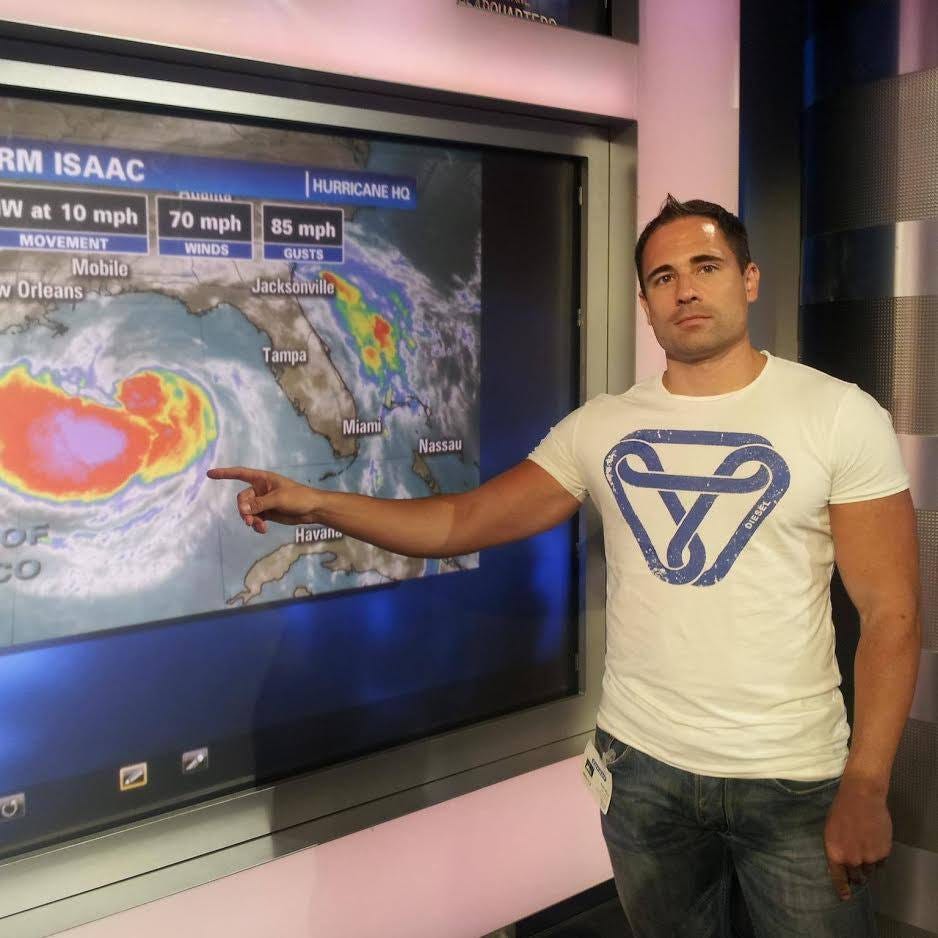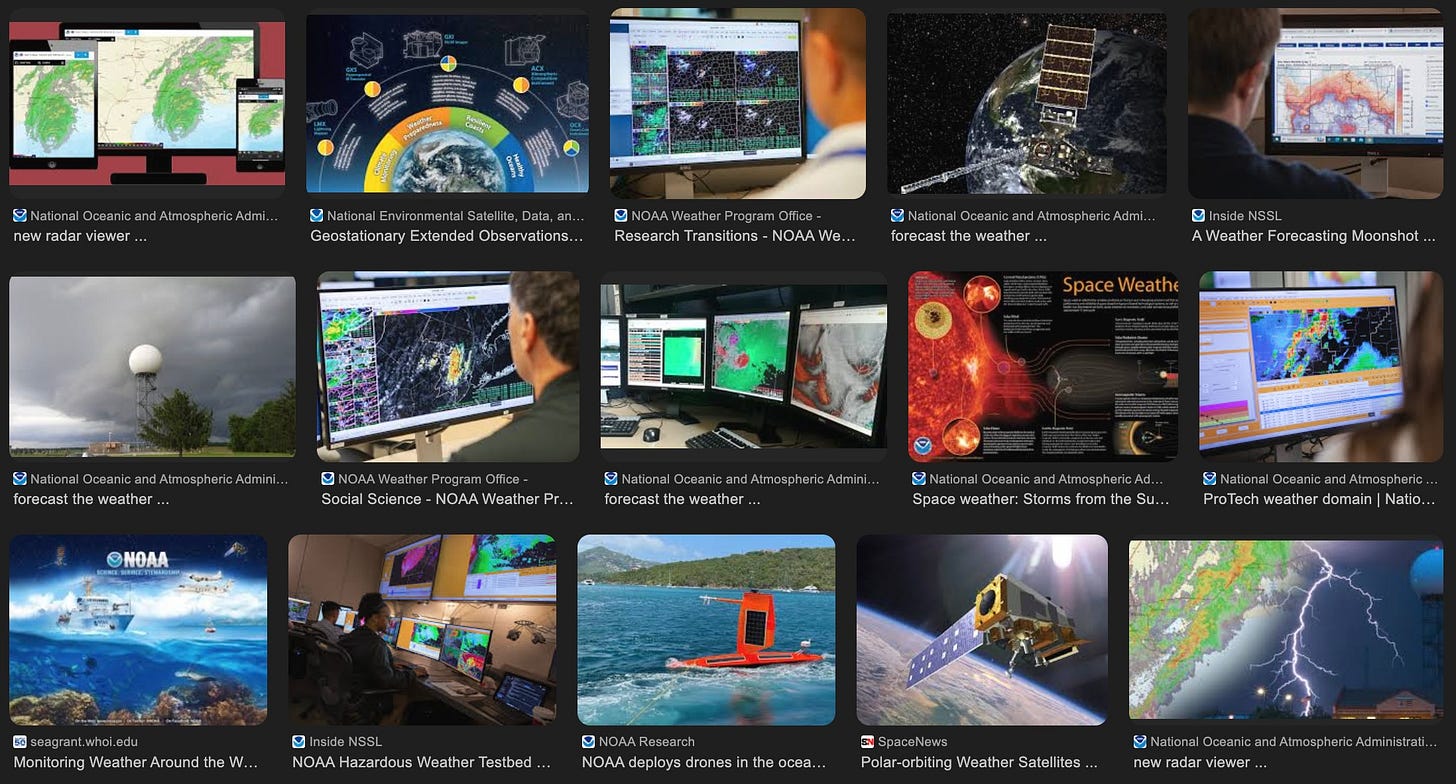If you care about extreme weather preparedness, I hope you follow research meteorologist Ryan Maue’s
Substack.And I also hope you read and share his New York Times op-ed warning the incoming Republican-controlled Congress and the next Trump White House against rash actions at NOAA, the National Oceanic and Atmospheric Administration.
Here’s my paywall-free gift link to Republicans Would Regret Letting Elon Musk Ax Weather Forecasting and here’s the nut:
For people who care about weather and climate, one of the most concerning proposals on the table is to dismantle the National Oceanic and Atmospheric Administration. The authors of Project 2025, a blueprint for the administration crafted by conservative organizations, claim erroneously that NOAA is “one of the main drivers of the climate change alarm industry” and should be “broken down and downsized.” An arm of Mr. Trump’s team, the Department of Government Efficiency, to be led by Elon Musk and Vivek Ramaswamy, wants to eliminate $500 billion in spending by cutting programs whose funding has expired. That could include NOAA.
With the rising costs of and vulnerability to extreme weather in a changing climate for the United States, dismantling or defunding NOAA would be a catastrophic error. Rather, there is a golden opportunity to modernize the agency by expanding its capacity for research and innovation. This would not only help Americans better prepare for and survive extreme weather but also keep NOAA from falling further behind similar agencies in Europe. While the incoming administration may want to take a sledgehammer to the federal government, there is broad, bipartisan support for NOAA in Congress. It is the job of the incoming Republican-controlled Congress to invest in its future.
In the op-ed, Maue highlights sustained efforts by Republican Rep. Frank Lucas of Oklahoma’s 3rd District to forge legislation advancing NOAA’s capacities to do its work and, most recently, to establish it as a freestanding agency. Listen to this April 2023 House Science, Space and Technology Committee hearing on Establishing an Independent NOAA for more:
As Maue writes:
While there are already multiple efforts at NOAA to improve weather modeling, observation collection and marine management, Congress has piled more responsibilities on the agency, and the funding has not kept up. NOAA is spread thin, with a backlog of maintenance and upgrades that will probably take years to get through without significantly more sustained budget support.
Given that Maue served for a time as NOAA chief scientist in the first Trump administration, there’s actually a chance what he says here may reach key members of Congress - if not necessarily penetrate Trump’s growing protective ring of loyalists. (His tenure in the first Trump administration was bumpy, as the Washington Post explains.)
Here’s his kicker:
We are in a golden age of technological advancement in understanding and predicting what is happening in the atmosphere and the oceans, and NOAA is uniquely well positioned to lead the way. Instead of jettisoning decades of expertise, we need an all-hands-on-deck NOAA modernization strategy to meet a rapidly changing climate. Building a weather-ready nation for the future will require hard work, but Americans of all political stripes should back NOAA to lead the way.
Maue has frequently been disparaged by progressive climate campaigners and scientists, given a pedigree including a stint at the libertarian Cato Insitute. But I’ve found his views on extreme weather and human-driven climate change mostly sync with the state of climate science as laid out by the Intergovernmental Panel on Climate Change.

INSERT, 12/1, 2 pm ET - The University of Georgia climate and weather scientist J. Marshall Shepherd pointed me to a WeatherGeeks episode he did with Rep. Frank Lucas: Enshrining NOAA into Law. - end insert
Trump 1.0 adviser wanted more climate science
I hope Congress listens to Princeton physicist Will Happer, as well. Happer, who was vetted by Trump in early 2017 as a possible science adviser and, yes, thinks more carbon dioxide is great, warned that the United States needs more, not less, sustained climate monitoring and analysis in a video interview I did while reporting a Propublica story:
Will Happer:
I’m all for climate science. You know. If I were king, I would maintain and improve, if I could, any measurement systems we have — satellites, ocean buoys. I think those are wonderful things…. One of our problems in climate is there you need long-term good science — for example long-term temperature records, long-term records of CO2, and it’s very hard for the government to support that kind of stuff because you go to Congress and they say, ‘Isn’t that what you were doing 20 years ago or 50 years. Aren’t you finished yet?’
Better weather warnings and a disaster review board
I also suggest you watch my related weather-forecasting conversation with another longtime extreme weather meteorologist, Mike Smith. For many years he’s warned about the declining skill of National Weather Service tornado and thundersrtorm warnings and he’s a longtime advocate for a National Disaster Review Board.






Longtime extreme weather meteorologist Mike Smith has posted a reaction to Maue's op-ed. Here's an excerpt and link: https://www.mikesmithenterprisesblog.com/2024/12/the-future-of-noaa-and-national-weather.html#google_vignette Ryan believes that NOAA can be fixed. I am not optimistic that is the case. NOAA has become politicized which, in Washington, is terribly difficult to repair. Its tornado warnings are less accurate than they were a dozen years ago. It misses major storms: for example, it was too late recognizing the catastrophic flood threat in the Appalachians from Hurricane Helene. Its infrastructure is literally falling apart.
Given civil service rules, I just can't see doing the same thing -- albeit with more money -- is the solution, regardless of who President Trump picks to lead the agency.